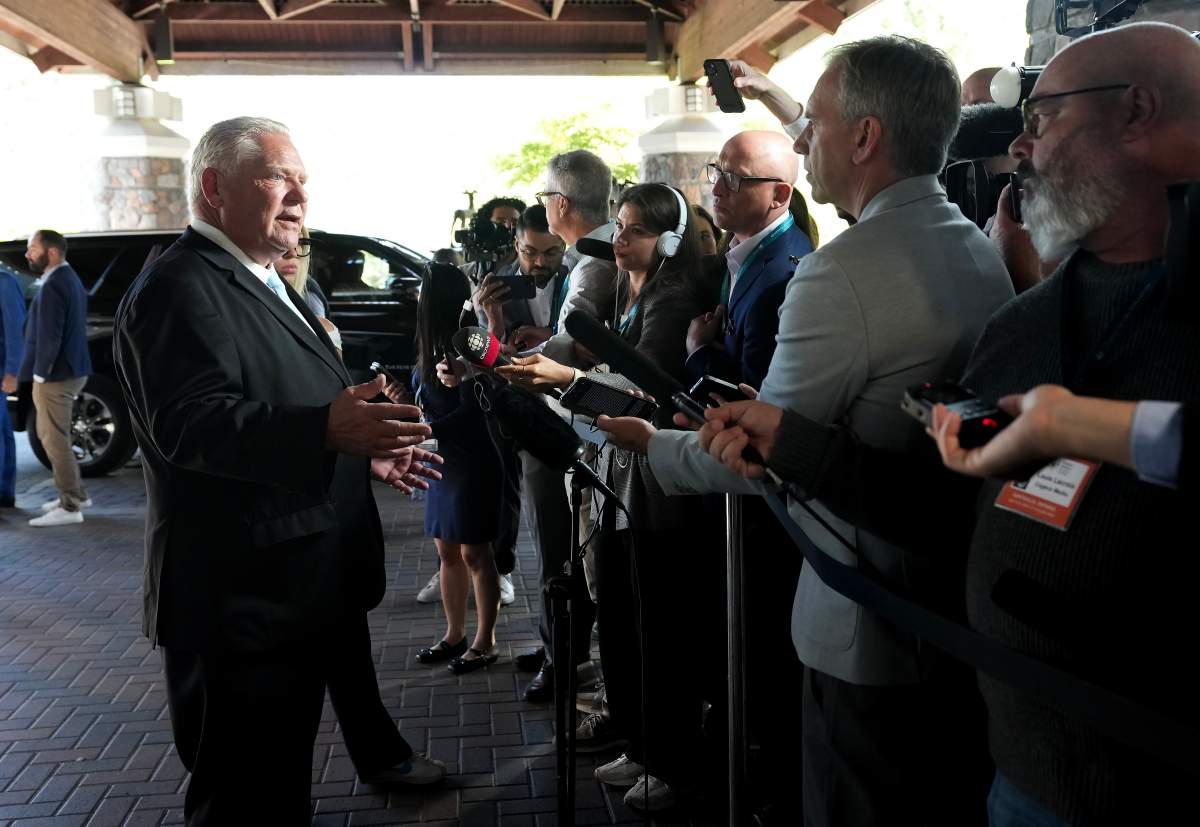Leaders from across Canada have arrived in Ontario’s cottage country for a series of high-stakes meetings, making Huntsville, Ont., the centre of the nation’s power for the next three days.

Before midday on Monday, a convoy of Canada’s premiers swept into Deerhurst Resort, nestled in the lakes and forests of Muskoka, for a summer gathering of the Council of the Federation.
Topics they’re set to discuss include trade, energy, immigration and U.S.-Canada relations, among other topics.
Prime Minister Mark Carney will be in Huntsville for a separate meeting with provincial leaders on Tuesday.
Ontario Premier Doug Ford, who will chair his last meeting as the head of the group this week, selected the rural setting, close to his own cottage, to show off what his team believes is the best of the province.
“I’m feeling fantastic — welcome to Huntsville, a great town,” Ford said as he arrived on Monday morning. “We’re just excited about our next couple of days together.”
Ford welcomes country's leaders to cottage country
The summer meeting of the Council of the Federation offers Premier Ford an opportunity to show off his province as he lets go of his role at the head of the group.
A senior government source, speaking on background, said the annual meeting had a sense of “friendly competition,” as hosts try to dazzle other leaders with the best of their province.

Get breaking National news
As the motorcade of Canada’s premiers drove north from Toronto along Highway 400 on Monday morning, they were met with a hint of the spectacle Ontario plans to put on for them. Atop the overpasses and bridges in Barrie, Ont., were flags for each province and territory, along with a banner that read, “Welcome Canada’s premiers to Barrie, Ontario.”
The Ford government’s hosting plan will continue on Monday evening with a personal touch. The premier owns a cottage near Huntsville, set on the beautiful waterfront of a rural area. It is there that Ford will hold an intimate dinner for leaders and their immediate family, the night before the event kicks off in earnest.
On Tuesday, Carney will take part in a meeting with the country’s first ministers. The Ontario source said the premier’s office expects that meeting to involve a briefing on Canada-U.S. trade negotiations and an early outline of how different governments will work together if tariffs hit.
U.S. President Donald Trump said he would impose 35 per cent across-the-board tariffs on Canada on Aug. 1, as trade talks between the two countries appear to stall.
After meeting with Canada’s premiers to discuss that threat and broader trade talks on Tuesday morning, Carney will depart, and the premiers will convene for a working lunch, attended by two former ambassadors. The conversations are expected to focus on U.S. trade relations, with an update on wildfire responses.
During the evening, Ford will host a gala for provincial leaders, business and health care stakeholders, as well as Indigenous representatives. Ontario’s Lieutenant Governor will also offer opening remarks at the evening reception.
More MOUs and other meetings
On Wednesday, the premiers will meet again — this time to discuss public safety and bail reform, as well as health care. The meeting will end with a news conference.
At the peripheries of the premiers’ official itinerary, other meetings will also take place. Nursing stakeholders will take part in one early meeting, while Indigenous leaders will meet with premiers for discussions, too.
Ontario, the source said, also plans to unveil new memoranda of understanding with provinces. They include new agreements to explore and advocate for pipelines, as well as promises to reduce internal trade barriers.
The Council of the Federation has taken on increased significance in the face of tariffs and threats from the United States.
The table allows the leaders of the country’s various provinces and territories to find areas of agreement both on national projects and, most recently, on internal trade.
Led by Ford and Nova Scotia Premier Tim Houston, many provinces have introduced legislative and regulatory changes to reduce trade barriers between provinces.
Moves to harmonize labour rights, safety standards and alcohol sales have all been introduced to make it easier to trade between provinces and attempt to reduce Canada’s reliance on the United States.
Recently, Ford has also joined Alberta Premier Danielle Smith in asking for new national pipelines to be built, framing the issue as one of national security.




Comments